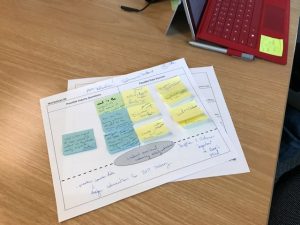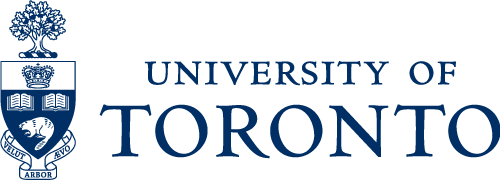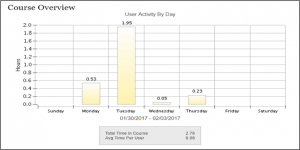This eCampus Ontario funded project aims to develop models for use of data-informed design at the course/instructor level and to increase capacity in this domain through a peer-based, collaborative faculty development initiative.
The overarching goal is to encourage use of data from learning management systems, course evaluation, course gradebooks and other sources related to learner activity to better inform the design of instructional environments.
It will impact institutional practice within the University of Toronto and beyond by establishing a faculty development program format that can be replicated or extended. Descriptions of pilot Workshop Activities are described below.
Each participating instructor has also authored a “project profile,” describing their goals, methods, implementation strategy, and their findings.
You can view the full report on our Data Driven Design Final Report website.
Lead Instructors
The six lead instructors are from various divisions/departments, including:
- Brett Beston (UTM – Psychology)
- Brenda McCabe (Engineering – Civil and Mineral)
- Sandra Merklinger (Nursing)
- Libbie Mills (Faculty of Arts and Science – Study of Religion)
- Franco Taverna (Faculty of Arts and Science – Human Biology)
- Marie-Anne Visoi (Faculty of Arts and Science – French)
The lead instructors will identify areas of interest/challenges regarding their teaching practice that can be informed by analysis of quantitative data available within their selected course context. An inquiry process based on their individual interests will thus form the basis of a “Data-Driven Design Project” that each instructor will plan and implement.
To support this process, CTSI staff with expertise in teaching assessment, data collection and analysis methodologies will co-facilitate group activities to explore the approaches proposed by instructors.
If you are interested in replicating this process you can download materials and guidelines from the Data Driven Design Tool Kit website.
Workshop #1: Community Network Orientation
We held our first workshop for instructors and educational technology professionals on May 16. The instructor network met for the first time, along with ed tech support team members and the project facilitators.

The outcomes of the day were to:
- – Describe their role in the project and in our community network
- – Support a culture of sharing and learning together
- – Identify personal strengths and available supports
- – Cultivate a mindset toward the generation of an inquiry idea
- – Generate possible data sources and questions
Working with ed tech professionals each team ended the day with a better idea of the questions they can ask and the data sources to support their inquiry.
Workshop #2: Confirming Project Scope and Planning
Our second team workshop was held on June 22. Once again we were able to bring the lead instructors and ed tech professionals together in the same room (some virtually) to meet the following outcomes:
- – Confirm scope and requirements – supported by revisiting of deliverables
- – Share individual updates on planning
- – Receive personalized feedback from peers and project team

Image from Pixabay. CC0
Having worked on identifying their data sources and inquiry questions to hone in on an inquiry theme or topic, the main session of the workshop was spent sharing and giving and receiving feedback. Each team had 5 minutes to present and 10 minutes to discuss feedback. The unique perspectives brought by faculty from various disciplines and the support of ed tech professionals with differing strengths proved fruitful for problem solving.
At the end of the workshop each instructor had a more finely tuned inquiry theme, as well as ideas and strategies to execute their project.
Workshop #3: Project Implementation Updates and Portfolio Planning
Our third team meeting took place on November 07 where we all gathered in person, and virtually, once more to share and discuss the following:
- – Describe planning and implementation to date
- – Begin planning for publishing project profiles
- – Engage in discussion of sharing activities/leadership roles
We began with a round table where each instructor was given 5 minutes to share progress and questions and receive feedback.
With everyone’s progress in mind we also shared the portfolio template with example text to help envision what our sharing website will look like. We also reviewed the process for sharing templates for final publishing. We ended the workshop with a discussion on our dissemination activities and next steps. By the end of the workshop each instructor had an idea of how they can bring their inquiry theme in a template for sharing broadly.
Workshop #4: Updates and Portfolio Sharing/Runthrough for Sharing Event

Image from Pixabay. CC0
For our fourth and final team meeting on February 28 the primary activity was to share the results of the project (consolidate and articulate what we have learned through this process) with a runthrough of their findings as preparation for the sharing event to take place after the end of the workshop series. Each instructor had 10 mins to:
- 5 minutes to present template and outcomes to date
- 5 minutes for peers to ask questions and provide feedback
In order to prepare for this session we created a shared google drive folder in which each instructor had a personal folder with a copy of the profile template included. They are able to use this template to populate their information with word count estimates for each section of the profile. The information they provided was used to generate the public facing profile page. For an example see the D3 Project Showcase.
For more information please contact online.learning@utoronto.ca

